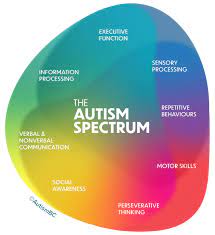
Autism: Autism is a disorder of neural development characterized by impaired social interaction and communication, and by restricted and repetitive behavior.
For a diagnosis to be made, symptoms must become apparent before a child is three years old. Autism affects information processing in the brain by altering how nerve cells and their synapses connect and organize; how this occurs is not well understood.
Autism is one of three recognized disorders in the autism spectrum (ASDs), the other two being Asperger syndrome, which lacks delays in cognitive development and language, and pervasive developmental disorder not otherwise specified (commonly abbreviated as PDD-NOS), which is diagnosed when the full set of criteria for autism or Asperger syndrome are not met.
Causes:
Autism has a strong genetic basis, although the genetics of autism are complex and it is unclear whether ASD is explained more by rare mutations, or by rare combinations of common genetic variants. In rare cases, autism is strongly associated with agents that cause birth defects. Controversies surround other proposed environmental causes, such as heavy metals, pesticides or childhood vaccines. the vaccine hypotheses are biologically implausible and lack convincing scientific evidence.
Sign and Symptoms:
The prevalence of autism is about 1–2 per 1,000 people worldwide, and the Centers for Disease Control and Prevention (CDC) report 11.3 per 1,000 children in the United States are diagnosed with ASD as of 2008. The number of people diagnosed with autism has increased dramatically since the 1980s, partly due to changes in diagnostic practice.
Early signs of autism in babies and toddler:
Doesn’t make eye contact (e.g. look at you when being fed).
Doesn't smile when smiled at.
Doesn't respond to his or her name or to the sound of a familiar voice.
Doesn’t follow objects visually.
Doesn't point or wave goodbye or use other gestures to communicate.
Doesn’t follow the gesture when you point things out.
Doesn’t make noises to get your attention.
Doesn’t initiate or respond to cuddling.
Doesn’t imitate your movements and facial expressions.
Doesn’t reach out to be picked up.
Doesn’t play with other people or share interest and enjoyment.
Doesn’t ask for help or make other basic requests.
The following delays warrant an immediate evaluation by your child’s pediatrician.
By 6 months: No big smiles or other warm, joyful expressions.
By 9 months: No back-and-forth sharing of sounds, smiles, or other facial expressions.
By 12 months: Lack of response to name.
By 12 months: No babbling or “baby talk.”
By 12 months: No back-and-forth gestures, such as pointing, showing, reaching, or waving.
By 16 months: No spoken words.
By 24 months: No meaningful two-word phrases that don’t involve imitating or repeating.
Treatment and Management of Autism:
Parents usually notice signs in the first two years of their child's life. The signs usually develop gradually, but some autistic children first develop more normally and then regress. Early behavioral or cognitive intervention can help autistic children gain self-care, social, and communication skills. Although there is no known cure, there have been reported cases of children who recovered. Not many children with autism live independently after reaching adulthood, though some become successful. An autistic culture has developed, with some individuals seeking a cure and others believing autism should be accepted as a difference and not treated as a disorder.
Homeopathic Treatment of Autism: Homeopathic treatment along with psychological therapies bring significant change in an autistic patient.